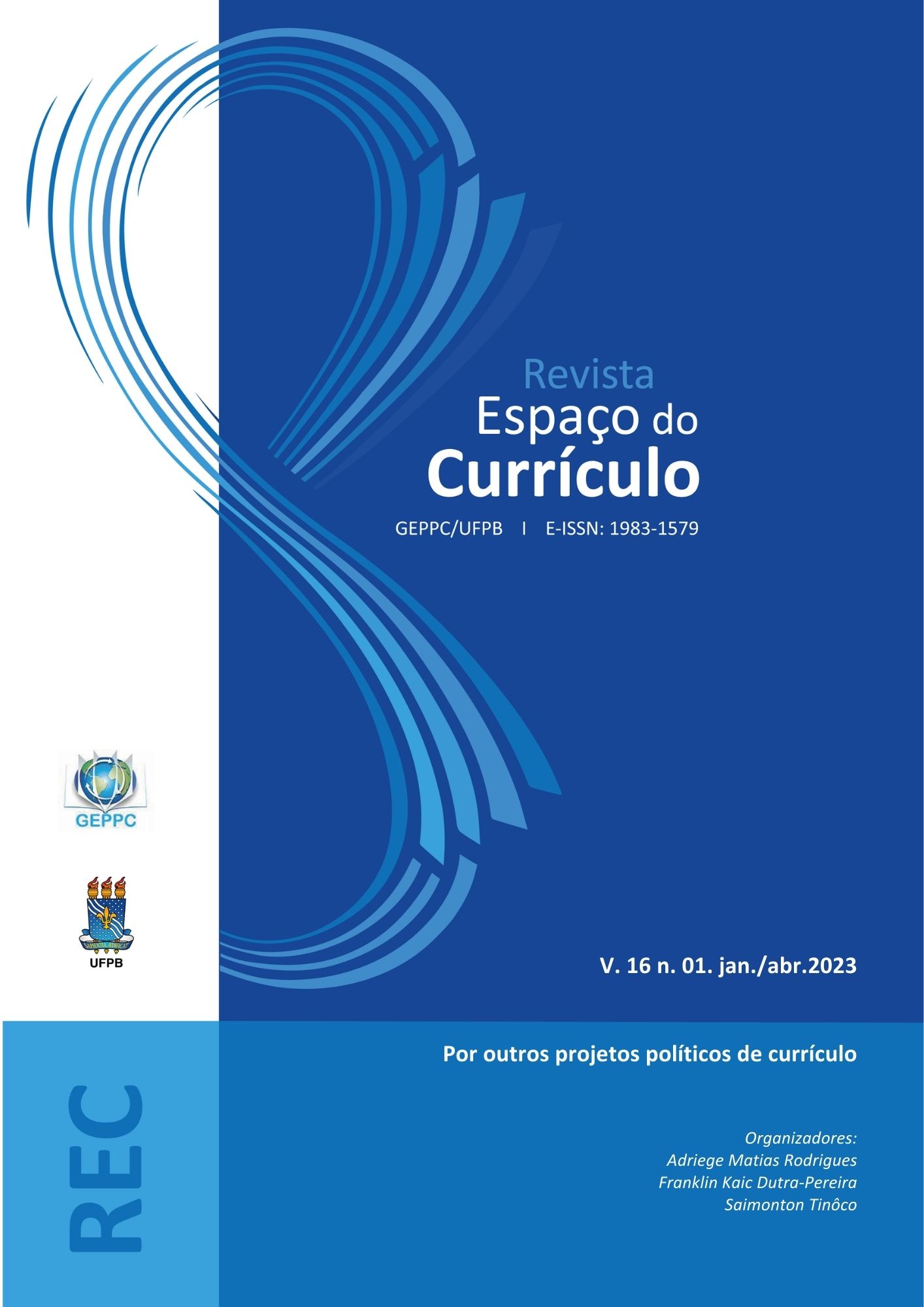CURRICULUM
diversity and tensions in the educational context
DOI:
https://doi.org/10.15687/rec.v16i1.63644Keywords:
Curriculum, Educational Context, DiversityAbstract
The objective of this article is to discuss the main conceptions of curriculum in the educational scenario based on four distinct theoretical-methodological currents, such as the Humanist curriculum, the Academic curriculum, the Technological curriculum and the Social Reconstructionist curriculum. As a methodological path, this is a qualitative approach, in which documentary research was adopted. In the final considerations, it is noted that the curriculum is not a field of epistemological neutrality, on the contrary, it is a space of clash and tensions. From the analysis, it was found that the Social Reconstructionist curriculum is more committed to a critical and emancipatory education, considering that it aims to instrumentalize the subject with the theoretical-scientific-cultural collection elaborated by humanity along the historical courts, a socio-historically situated curriculum with a view to the humanization of the subject.
Downloads
Metrics
References
ADORNO, Sérgio. Os aprendizes do poder: o bacharelismo liberal na política brasileira. 2. ed. rev. São Paulo: Edusp, 2019.
ADORNO, Theodor Ludwig Wiesengrund. Teoria da semicultura. Tradução Newton Ramos de Oliveira. Educação e Sociedade, Campinas, v. 15, n. 56, p. 338-411, dez. 1996.
APPLE, Michael Whitman. A luta pela democracia na educação crítica. Revista e-Curriculum, São Paulo, v. 15, n. 4, p. 894-926, out./dez. 2017. Disponível em: https://revistas.pucsp.br/index.php/curriculum/article/view/35530. Acesso em: 25 mar. 2022.
APPLE, Michael Whitman. Ideologia e currículo. Tradução de Carlos Educardo Ferreira de Carvalho. São Paulo: Brasiliense, 1982.
BRASIL. Lei n.º 9.394, de 20 de dezembro de 1996. Estabelece as diretrizes e bases da educação nacional. Disponível em: http://www.planalto.gov.br/ccivil_03/leis/l9394.htm. Acesso em: 17 jan. 2021.
DUSSEL, Enrique. Pedagogica latinoamericana. Bogotá: Nueva America, 1980.
FREIRE, Paulo. Pedagogia da esperança: um reencontro com a pedagogia do oprimido. 9. ed. São Paulo: Paz e Terra, 2002.
FREIRE, Paulo. Pedagogia do oprimido. 74. ed. São Paulo: Paz e Terra, 2020.
FREIRE, Paulo; SHOR, Ira. Medo e ousadia: o cotidiano do professor. 14. ed. São Paulo: Paz e Terra, 2021.
GUEDES, Neide Cavalcante; ARAUJO, Hilda Mara Lopes. Fios se unem nas tramas do currículo e da formação. Revista e-Curriculum, São Paulo, v. 15, n. 3, p. 764–786, jul./set.2017.
HOOKS, Bell. Ensinando a transgredir: a educação como prática da liberdade. São Paulo: Martins Fontes, 2017.
LLAVADOR, F. Beltrán. Las determinaciones y el cambio del currículo. In: ANGULO, José Félix; BLANCO, Nieves (Coord.). Teoría y desarrollo del currículo. Málaga: Ediciones Aljibe, 1994. p. 369-383.
LUCKESI, Cipriano Carlos. Tendências pedagógicas na prática escolar. In: LUCKESI, Cipriano Carlos. Filosofia da Educação. São Paulo: Cortez, 2005. p. 53- 75.
MACHADO, Antônio Alberto. Ensino jurídico e mudança social. 2. ed. São Paulo: Expressão Popular, 2009.
MCNEILL, John. D. Curriculum: A Comprehensive Introduction. 2. ed. Boston, Toronto: Little Brown and Company, 1981.
MOREIRA, Antonio Flavio Barbosa; SILVA, Tomaz Tadeu da (org.). Currículo, cultura e sociedade. 2. ed. São Paulo: Cortez, 1997. p. 7-31.
MOREIRA, Antonio Flavio. TADEU, Tomaz (org.). Currículo, cultura e sociedade. 12. ed. São Paulo: Cortez, 2013.
MOREIRA, Antonio Flavio Barbosa. Formação de professores e currículo: questões em debate. Revista Ensaio: avaliação em políticas públicas em educação, Rio de Janeiro, v. 29, n.110, p. 35-50, jan./mar. 2021.
PEREIRA, Luiz Ismael. Adorno e o direito: para uma crítica do capitalismo e do sujeito de direito. São Paulo: Ideias e Letras, 2018.
PIMENTA, Selma Garrido. Formação de professores: identidade e saberes. In: PIMENTA, Selma Garrido (org). Saberes pedagógicos e atividade docente. São Paulo: Cortez, 1999. p. 15-34.
RIBEIRO JÚNIOR, João. A formação pedagógica do professor de direito: conteúdos e alternativas metodológicas para a qualidade do ensino do direito. Campinas: Papirus, 2001.
SACRISTÁN, José Gimeno (org.). Saberes e incertezas sobre o currículo. Tradução por Alexandre Salvaterra. Revisão Técnica por Miguel González Arroyo. Porto Alegre: Penso, 2013.
SANTOS, Adriana Regina de Jesus; CASALI, Alipio Marcio Dias. Currículo e educação: origens, tendências e perspectivas na sociedade contemporânea. Olhar de Professor, Ponta Grossa, v. 12, n. 2, p. 207-231, 2009.
SANTOS, Adriana Regina de Jesus; LOPES, Rosana Pereira; COSTA, Rogerio da. Os sentidos referentes à classe social e relações de poder presentes no contexto das teorias curriculistas tradicionais e críticas. Revista e-Curriculum, São Paulo, v.15, n.2, p. 325 – 344 abr./jun.2017.
SAVIANI, Dermeval. Pedagogia histórico-crítica: primeiras aproximações. 11. ed. Campinas: Autores Associados, 2011.
SILVA, Maria Aparecida da. História do Currículo e Currículo como construção histórico-cultural. In: VI Congresso luso-brasileiro de História da Educação, 2006, Uberlândia. Anais do VI Congreso Luso-Brasileiro de História da Educação. Uberlândia: EDUFU, 2006. v. 1. p. 4820-4828.
Downloads
Published
How to Cite
Issue
Section
License
Copyright (c) 2022 Curriculum Space Journal

This work is licensed under a Creative Commons Attribution 4.0 International License.
By submitting an article to Curriculum Space Journal (CSJ) and having it approved, the authors agree to assign, without remuneration, the following rights to Curriculum Space Journal: first publication rights and permission for CSJ to redistribute this article. article and its metadata to the indexing and reference services that its editors deem appropriate.
















